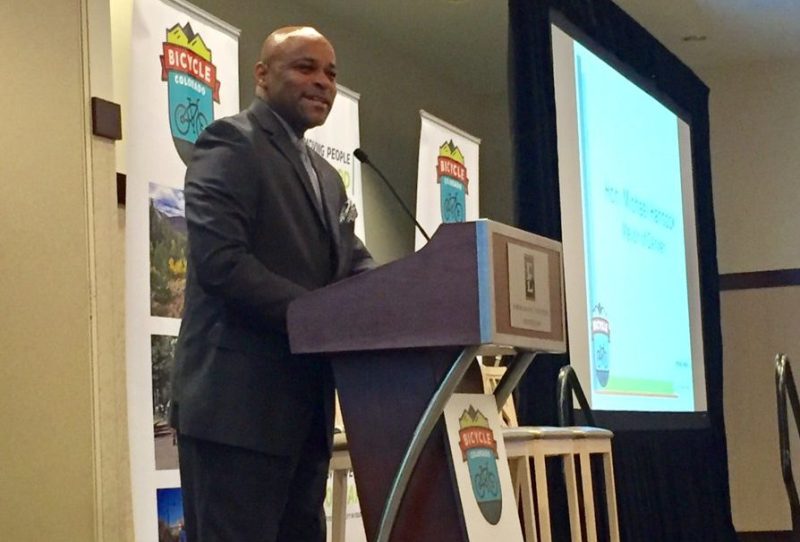It Sounds Like Hancock Is Serious About Prioritizing People Over Cars

Mayor Michael Hancock lent his most emphatic support yet to what he called “bold” investments in biking, walking, and transit yesterday in a speech he gave at Bicycle Colorado’s Moving People Forward conference.
He and Transportation Director Crissy Fanganello struck a markedly different tone than usual that seemed to prioritize people over cars.
“We need to absolutely transform our city from a car-focused, automobile-centric system, to a people-centric transportation and mobility network,” Hancock said.
Investments — presumably things like protected bike lanes, sidewalks, and better transit service — will come via a $550 million general obligation bond that will go to voters this November, Hancock said. He guaranteed a “significant portion” for “transportation and mobility.” Expect more specifics in the next few months, he told the audience.
The city also needs a recurring funding stream for transit, walking, and biking, Fanganello said during a panel discussion. City officials have discussed a potential funding measure in addition to the one-time infusion of transportation dollars.
“Can we not only build new projects with this general obligation bond, but also put into place a funding stream… that we can count on from one year to the next, to actually build out this complete multi-modal network?” Fanganello said. “Bikes are a part of that. If we don’t have a funding [stream] to take care of that and we’re asking on an annual basis to get that through our budgetary process, we don’t have the sense of stability that we need in order to keep moving. And that’s something that we could really use from our elected officials and, quite frankly, the voters.”
Fanganello also admitted that Denver transportation engineers and planners too often use the word “balance” when talking about streets. This is significant. “Balance” is often code for why streets can’t prioritize transit or people walking and biking over cars. As urban planning thought leader Brent Toderian told the crowd earlier in the day, urban streets should not try to achieve balance — they should prioritize people walking, biking, and using transit. Even if balance was the goal, streets are so heavily tilted towards driving, it would mean solely building and funding active transportation projects for years to come.
In his speech, Hancock compared 2017 to other touchstone moments in Denver’s transportation history: The 2004 FasTracks transit funding bill, the early 1990s decision to build Denver International Airport, and the city’s 19th-century connection to the transcontinental railroad.
“I believe in 2017 we have the same opportunity,” Hancock said. “And all of us who are blessed to be able to serve as elected officials, and all of us who are blessed to live in this great city and region, now have a clear call to summon the moral courage once again be bold and be visionary.”
This article was changed to reflect the fact that DIA was not initiated in 1994.


